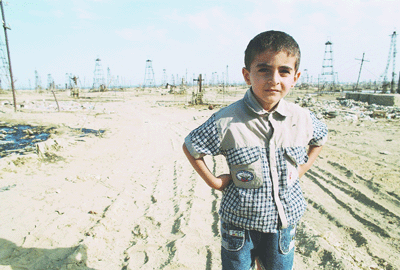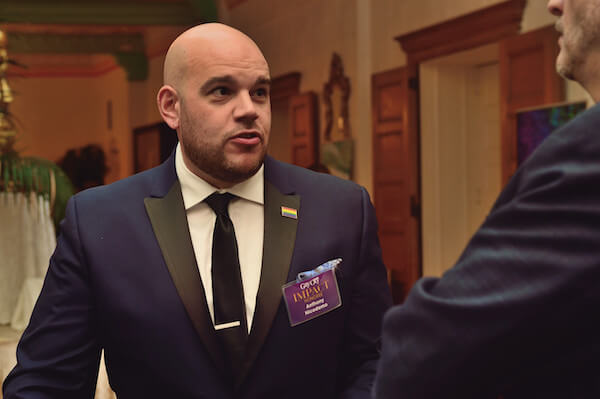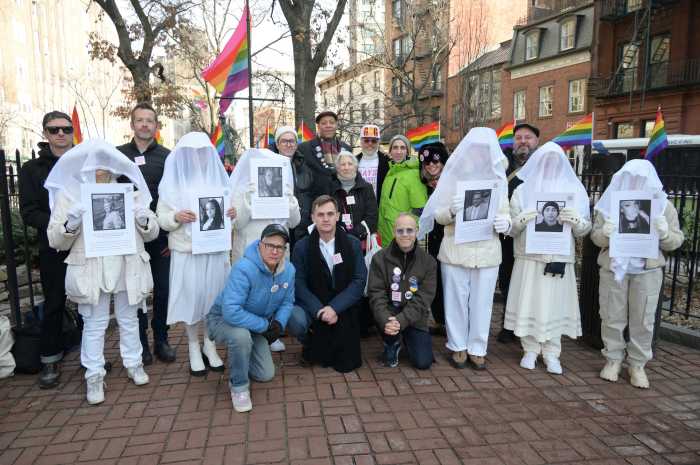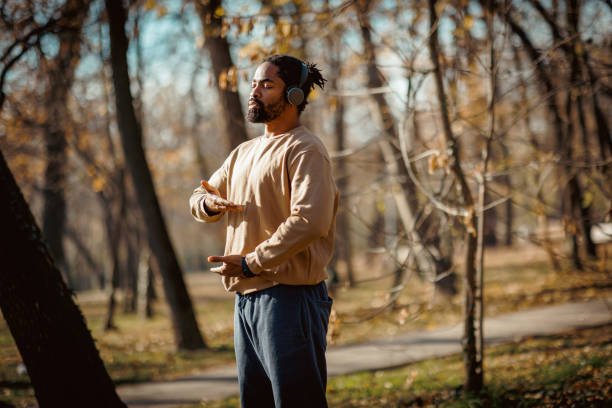Festival panoply of global struggle offers lessons in resistance
Watching the documentary “Source (Zdroj),” you’re bound to ask at one point, “What’s that cow doing grazing right next to that oil spill?” A farmer, tenanted on a patch of Azerbaijan’s Apsheron Peninsula, one of the world’s richest oil reserves, tells the Czech filmmakers that his family subsists on and sells the heifer’s dairy goods, as the camera pans to the farmer’s tender son, then back to the animal lowering its muzzle.
One of the many outstanding features in the 17th edition of the Human Rights Watch International Film Festival, Martin Marecek and Martin Skalsky’s “Source” only grows more alarming. Its young muckrakers adopt a faux-naïf shtick to get themselves brought to the Azerbaijani oil viziers whose blessing they require to shoot amid the derricks of Apsheron, a talon jutting into the Caspian Sea and fulcrum of the global resource wars.
“Source” deftly widens from observations of the oilfields’ stygian conditions to a critique of the Baku-Tbilisi-Ceyhan pipeline, the $3.5 billion, 1,100-mile project scheduled for completion in mid-August, designed to transport one million crude barrels per day from the Azerbaijani capital across seismically and otherwise unstable Transcaucasia to a Mediterranean Turkish port. The Bush regime’s support for the pipeline, financed by a British Petroleum–led consortium that also includes U.S. multinationals Unocal and ConocoPhillips, is framed by energy-lobby hawks as leverage against Iran’s and Russia’s purchase on Caspian Basin hydrocarbon reserves, their sights trained on Kazakhstan.
While interviewing Azeri peasants forcibly displaced by pipeline construction, the spirited Czechs are detained by authorities, an accidental show of solidarity with the peasants and lonely human rights dissidents like Mirvari Gahramanli, a stout blonde hellraiser in a tight fuchsia blouse who extemporizes on cancer clusters and compares Apsheron’s radiation levels to Chernobyl’s. Marecek and Skalsky keep things trotting, but brief inserts—sharply sprung newsreel montages, opalescent bituminous undulations—reveal their expressionist leanings.
“Switch-Off (Apaga y Vámonos),” by Catalan filmmaker Manel Mayol, is a blistering exposé of the Spanish-based multinational Endesa, which in 2004 added to its massive Latin American water and energy assets the Ralco hydroelectric dam erected across the Andean Biobío River against the objections and resistance of the indigenous Pehuenche-Mapuche. Mayol furnishes Endesa president Rodolfo Martín Villa’s damning résumé—national leader of Spain’s fascist students league, Barcelona’s governor under Franco, deputy to Bush lackey José María Aznar—and is alive to the historical ironies. The Biobío, Chile’s longest river, once formed the natural barrier impassable to the conquistadores. The only native nation formally recognized by the Iberian Crown, the Mapuche are now expelled, their burial grounds flooded, by a Spanish goliath.
The Mapuche spokespeople we meet in “Switch-Off” exude a hunger for justice conveyed powerfully and sometimes sardonically. Mayol employs the performative device of filming himself trying to get an Endesa bigwig on the phone, instead teasing out a half-hostile, half-confessional banter with a secretary named, rather too neatly, Beatriz. These ambiguous interludes alternate with sweeping aerials of the Cordillera’s ice-wreathed black alps and, above all, encounters with the Mapuche leaders, at least one of whom receives Mayol in a safe house, fugitive from authorities using anti-terrorism statutes to prosecute activists; one journalist relates how he was arrested and worked over for his cooperation with the film.
The militance of the displaced populations in “Switch-Off” and “Source” seems to pervade the spirit of the festival itself. Maintaining the same program volume, audience-friendly repeat screenings, and added-value sidebars as ever, the festival’s focus this year feels tougher, informed not only but the tenor of the selections but perhaps also by competition from Tribeca, which sucks into its honeyed gyre many films that would previously have debuted locally at HRWIFF. Whatever the reasons, the lineup is all sinew, and viewers approaching the festival from any angle—through the African documentaries “Black Gold” or “Refugee All-Stars,” say, or via the Iraq War chronicles “Winter in Baghdad” and “Iraq in Fragments”—will be moved and edified.
In this formidable company, the Yanks hold their own, with alums Shari Robertson and Michael Camerini previewing segments from their forthcoming immigration policy series “My American Dream: How Democracy Works Now,” and Bernadine Mellis’ “The Forest for the Trees,” a retelling of the trials of Earth First! activist Judi Bari through an intimate autobiographical prism. But the biggest surprise among U.S. titles is HRWIFF’s opening night selection, Anthony Giacchino’s defiantly unglamorous “Camden 28,” a semi-procedural that reconstructs a thwarted 1971 military draft board break-in by a bunch of working-class white Catholics in South Jersey.
A formally square cousin of “Investigation of a Flame,” Lynne Sachs’ experimental essay on the Catonsville 9, “Camden 28” grows compulsive as it unfolds, with genuine intrigue in the character of one Robert Hardy. A handyman who became privy to a radical Catholic fellowship’s plan to liberate records from the Camden draft board office to protest the Vietnam War, Hardy informed the FBI. Drafted as a covert operative, Hardy enabled the break-in, only to see the feds’ case crumble before a righteous jury.
The film’s reminder that not all those galvanized by the movements for social justice of the ‘60s were at Berkeley, Ann Arbor, or Columbia, but included America’s rank and file; the music of the narrators’ voices, whether fluted Philadelphia vowels or the Irish brogue of immigrant pastor Michael Doyle, who tends a ghetto parish to this day; the mellow clarity with which the participants articulate their choices and reflect on their actions—all these make “Camden 28” a joyous excursion, and the relevance of its depiction of federal domestic espionage scarcely requires comment.
gaycitynews.com




































